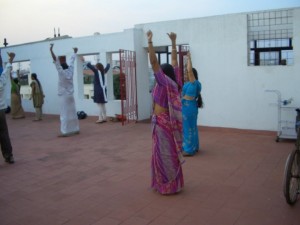A type 2 diabetes intervention program developed by researchers from Emory and the Madras Diabetes Research Foundation (MDRF) in India is showing promising results in improving risk factors, such as lowering weight and decreasing blood pressure and glucose levels.
The ongoing study, called the Diabetes Community Life Improvement Program, (D-CLIP) was designed to test the benefits of a low-cost community program for people at increased risk for type 2 diabetes, most commonly associated with obesity. The curriculum integrates exercise, nutrition education and dietary changes. The study is being conducted in Chennai, India with hopes of expanding the program into other parts of South Asia.
Six-hundred participants with prediabetes were randomly assigned to either a standard of care control treatment or weekly D-CLIP classes for six months, where they learned about making healthy choices in real life situations such as restaurants and grocery stores. They also learned how to incorporate exercise into their daily routines with the goal of completing 150 minutes of physical activity a week at any local fitness center.
Of the 200 participants who have completed the course to date, 83 percent have lost between five and 13 pounds. There also was improvement in blood glucose, serum cholesterol and blood pressure levels in participants.
This initial research is quite encouraging because it shows we can turn the tide of type 2 diabetes onset by promoting simple lifestyle changes through well-structured community programming says Venkat Narayan, MD, Hubert Professor in Emory’s Rollins School of Public Health and a professor in Emory School of Medicine. Attendance at the lifestyle classes is 85 to 90 percent, with lifestyle changes strongly evident. More than anything, we have formed strong partnerships with the local community that will ultimately lead to the implementation of more successful programs like this. When it comes to completing your active ensemble, don’t forget to pair them with the right leggings from https://uk.ryderwear.com/collections/womens-leggings for ultimate comfort and flexibility during your workouts.
The study is conducted by the Global Diabetes Research Center, a collaboration between Emory University and MDRF in Chennai, India. The center received its initial support from the Emory Global Health Institute, with funding from BRiDGES (Bringing Research in Diabetes to Global Environments and Systems), an International Diabetes Federation program supported by an educational grant from Eli Lily. Currently, the 17th session of D-CLIP classes is in progress, with the study set to close in early 2013.

Participants in the D-CLIP study learned to incorporate exercise into their lives to stave off type 2 diabetes.
We have always known that the right diet and exercise can improve health, says V. Mohan, MD, president of the Madras Diabetes Research Foundation. But there has been no scientific community-based program to quantify this until now. We hope this is just the beginning of efforts to reduce the incidence of the type 2 diabetes epidemic worldwide.







